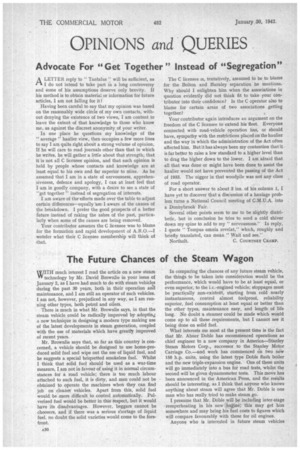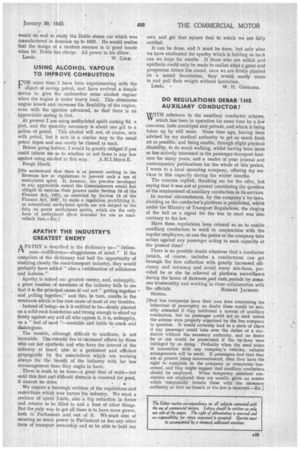The Future Chances of the Steam Wagon
Page 32

Page 35

If you've noticed an error in this article please click here to report it so we can fix it.
WITH much interest I read the article on a new steam VV technology by Mr. David Brownlie in your issue of January 2, as I have had much to do with steam vehicles during the past 30 years, both in their operation an maintenance, and I am still an operator of such vehicles. I am not, however, prejudiced in any way, as I am running other types, both petrol and oilers.
There is much in what Mr. Brownlie says, in that the steam vehicle could be radically improved by adopting a new technique in designing a modern type making use of the latest developments in steam generation, coupled with the use of materials which have greatly improved of recent years.
Mr. Brownlie says that, so far as this country is concerned, a vehicle should be designed to use home-produced solid fuel and wipe out the use of liquid fuel, and he suggests a special briquetted smokeless fuel. Whilst I think that solid fuel should be used as a war-time measure, I am not in favour of using it in normal circumstances for a road vehicle; there is too much labour attached to such fuel, it is dirty, and men could not be obtained to operate the machines when they can find job on cleaner vehicles. Apart from this, solid fuel would be more difficult to control automatically. Pulverized fuel would be better in this respect, but it would have its disadvantages. However, beggars cannot be choosers, and if there was a serious shortage of liquid fuel, no doubt the solid varieties would come to the forefront. In comparing the chances of any future steam vehicle, the things to be taken into consideration would be the performance, which would have to be at least equal, or even superior, to the i.c.-engined vehicle; stoppages must be practically non-existent, starting from cold nearly instantaneous, control almost foolproof, reliability superior, fuel consumption at least equal or better than the other types, maintenance easy, and length of life long. No doubt a steamer could be made which would come up to all these requirements, but I cannot see it being done on solid fuel.
What interests me most at the present time is the fact that Mr. Abner Doble has recommenced operations as chief engineer to a new company in America—Stanley Steam Motors Corp., successor to the Stanley Motor Carriage Co.—and work has commenced On two new 150 h.p. units, using the latest type Doble flash boiler and the new triple-expansion engine.. One of these units will go immediately into a bus for road tests, whilst the second will be given dynamometer tests. This move has been announced in the American Press, and the results should be interesting, as I think that anyone who knows anything about steam will agree that Mr. Doble is one man who has really tried to make steam,go.
I presume that Mr. Doble will be including inter-stage resuperheating in his new *gine; this may get him somewhere and may bring his fuel costs to figures which will compare favourably with those for oil engines.
Anyone who is interested in future steam vehicles
would do well to study the Doble steam car which was manufactured in America up to 1932. He would realize that the design of a modem steamer is in good hands when Mr. Doble has charge. All power to his elbow.
Leeds. W. Cosa.
USING. ALCOHOL VAPOUR TO IMPROVE COMBUSTION rOR some time I have been experimenting with the object of saving petrol, and have evolved a simple device to give the carburetter some alcohol vapour when the engine is under heavy load. This eliminates engine knock and increases the flexibility of the engine, even with the ignition advanced, so that there is an appreciable saving in fuel.
At present I am using methylated spirit costing 8d. a pint, and the quantity necessary is about one gill to a gallon of petrol. This alcohol will not, of course, mix with petrol, but it acts in a similar way to the usual petrol dopes and can surely be classed as such.
Before going farther, I would be greatly obliged if you could inform me as to whether or not there is any law against using alcohol in this way. A.M.I. MEM .E.
Burgh Heath.
[We understand that there is at present nothing in the 'Revenue law or regulations to prevent such a use of methylated spirit. If, bowel,er, the practice developed to any appreciable extent the Commissioners would feel obliged to exercise their powers under Section 16 of the Finance Act, 1921, as amended by Section 13 of the Finance Act, 1927, to make a regulation prohibiting it, • as mineralized methylated spirits are not subject to the duty on power methylated spirits, which are the only form of methylated suit intended for use as road. vehicle fuel.—.ED.] APATHY THE INDUSTRY'S GREATEST ENEMY APATHY is described in the dictionary as—" listlessness—indifference—sluggishness of mind." If the compilers of the dictionary had had the opportunity of studying closely the road-transport industry, they would probably have added" also a combination of selfishness and laziness."
Apathy is indeed our greatest enemy, and, unhappily, a great number of members of the industry fails to see
that it is the principal cause of our not" getting together
. . and pulling together," and this, in turn, results in the weakness which is the root cause of most of our troubles.
Instead of being—as it is entitled to be—firmly planted on a solid-rock foundation and strong enough to stand up firmly against any and all who oppose it, it is, unhappily, on a "bed of sand "—unstable and liable to crack and disintegrate.
The trouble, although difficult to eradicate, is not incurable. The remedy lies in increased efforts by those who are not apathetic and who have the interest of the industry at heart; also in a persistent and efficient propaganda by the associations which are working always for the benefit of the industry with far less encouragement than they ought to have.
There is work to be done—a great deal of work—but until this first and difficult obstacle is remOved for good, it Cannot be done.
We require a thorough revision of the regulations and restrictions which now harass the industry. We want a revision of speed limits, also a big reduction in forms and returns to be filled in and a host of other things. But the only way to get all these is to have more power, both in Parliament and out of it. We must aim at securing as much power in Parliament as has any other form of transport ownership and so be able to hold our
own and get that square deal to which we are fdlly entitled.
It can be done, and it must be done, but only after we have eradicated the apathy which is holding us back can we hope for results. If those who are selfish and apathetic could only be made to realize what a great and prosperous future lies ahead, once we are firmly planted on a sound foundation, they would surely come in and pull their weight without hesitation.
Leeds. W. H. GODDARD.
DO REGULATIONS DEBAR THE AUXILIARY CONDUCTOR?
WITH reference to the auxiliary conductor scheme, VT which has been in operation for some time by a few concerns, both municipal and private, and which is being taken up by still more. Some time ago, having been advised by my medical authority to get as much fresh air as possible, and being unable, through slight physical disability, to do much walking, whilst having been more or less actively interested in the passenger-transport business for many years, and a reader of your journal and contemporary publications for the whole of this period, I wrote to a local operating company, offering my services in this capacity during the winter months.
The concern replied, thanking me for the offer, but saying that it was not at present considering the question of the employment of auxiliary conductors in its services.
In normal circumstances, by the company's by-laws, standing on the conductor's platform is prohibited, whilst under the Ministry of Transport Regulations, the ringing of the bell as a signal for the bus to start was also contrary to the law.
Have these regulations been relaxed so as to enable auxiliary conductors to work. in conjunction with the regular employees, or can the police or the company take action against any passenger acting in such capacity at the present time?
There is no possible doubt whatever that a conductor (which, of course, includes a conductress) can get through the fare collection with greatly increased efficiency and accuracy and avoid many mis-fares, provided he or she be relieved of platform surveillance during the hours of darkness and rush,periods by someone trustworthy and working in close collaboration with the officials. ROBERT JACKSON.
Steeton.
[Most bus companies have their own laws concerning the behaviour of passengers; no doubt these would be suitably amended if they instituted a system of auxiliary conductors, but no passenger could act as such unless the scheme were properly organized by the bus company in question. It would certainly lead to a state of chaos if any passenger could take over the duties of a conductor without the necessary authority, and no doubt he or she would be prosecuted if the by-laws were infringed by so doing. Probably when the need arises in connection with any company's vehicles, suitable arrangements will be made. If passengers find that they are at present being inconvenienced, then they have the right to complain to the company or companies concerned, and they might suggest that auxiliary conductors should be employed. When temporary assistant conductors are employed they are usually given an armlet which temporarily invests them with the necessary authority so that no breach of the law is incurred.—En.]




















































